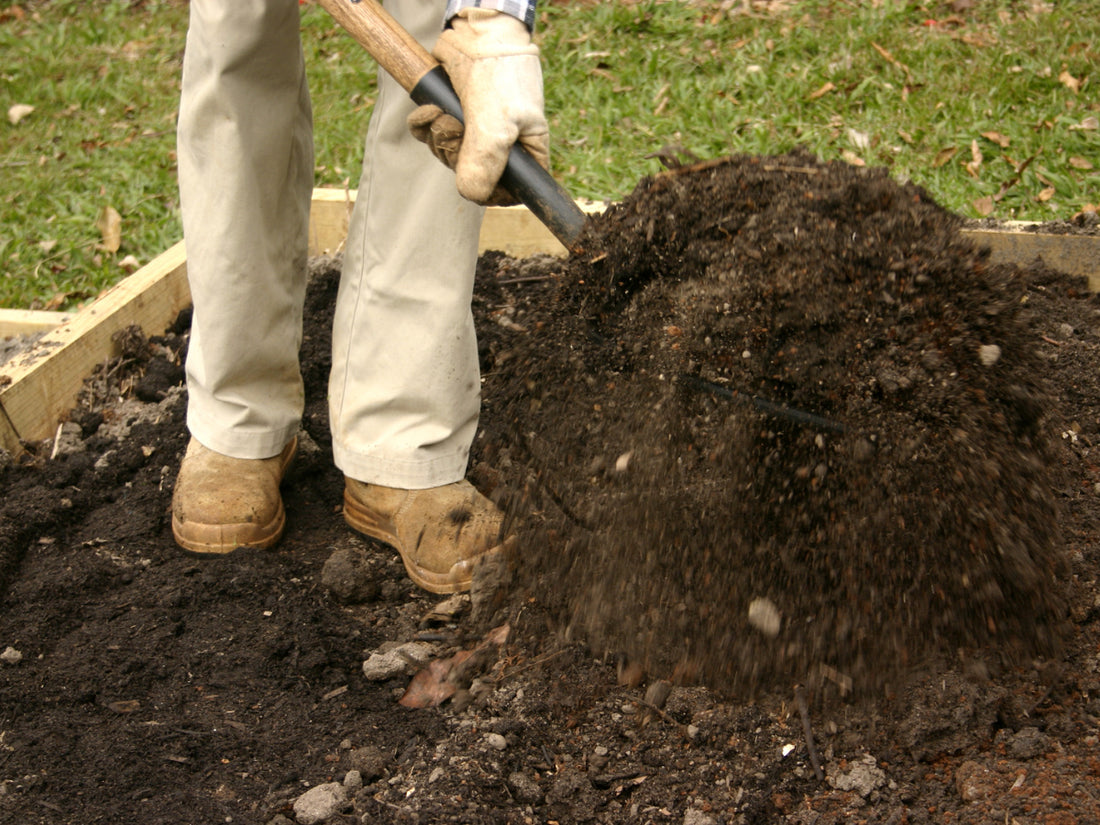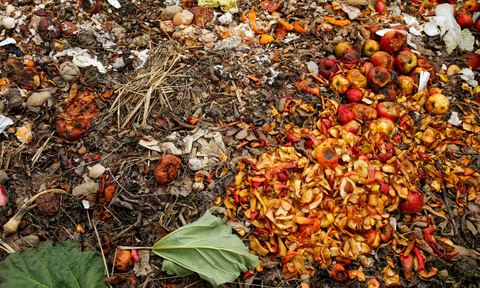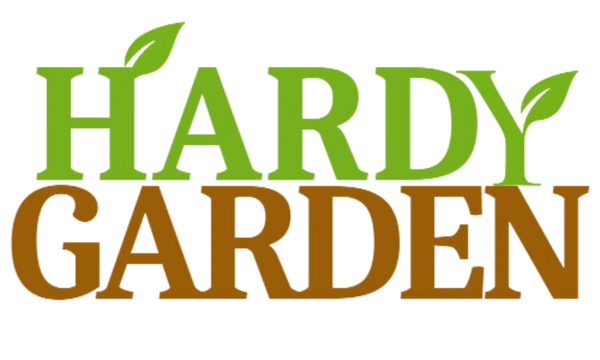
What are the Best Garden Soil Amendments and How to Choose Them
Selecting optimal garden soil amendments is crucial for plant health. They enhance soil structure, drainage, airflow, and water retention. In this guide, we'll explore key factors such as nutrient content and soil type to empower you to make informed choices and unleash your garden's full potential.
For soil amendments to work, they must be mixed into the soil correctly. Burying it makes it less effective and stops water and air from getting to the ground, slowing the growth of plants.
Join us as we dig into the amazing world of garden soil amendments and uncover the secrets of growing robust plants.
Inorganic Vs Organic Soil Amendments
Organic:

Soil amendments can be classified as either "organic" or "inorganic." All organic soil amendments start with either plant- or animal-based sources. Plant-based amendments are derived from compost pile, green manure, and mulch. Animal-based amendments are derived from materials such as manure, bone meal, and blood meal.
Not all organic matter is suitable for the soil as amendments. Wood ash is an organic fertilizer with a high pH and salt content. It can make problems with the soil worse, so it shouldn't be used as an amendment. Don't mix sand into clay soil because it makes the soil hard, like concrete. Always conduct soil test before applying soil amendment to your garden bed.
Incorporating organic matter into the soil is beneficial in numerous ways, and natural soil amendment is one way to do it. Over time, organic matter makes the soil better at letting air in, letting water in, and holding water and nutrients.
Numerous organic alterations serve as natural fertilizers since they are rich in plant nutrients. Soil organisms, including bacteria, fungi, and earthworms, rely heavily on organic matter for energy.
Inorganic

Materials that are not formed from living creatures are referred to as inorganic garden soil amendment. While they have some advantages, it is vital to weigh both their advantages and disadvantages. Inorganic additions frequently provide a precise and readily available source of certain nutrients.
They can treat nutritional deficits fast and encourage focused plant development. Furthermore, inorganic amendments have a longer shelf life and are less susceptible to disintegration.
Their negatives, however, stem from their possible harmful impact on soil health and the ecosystem. Inorganic additions have the potential to alter the natural balance of soil microbes, obstruct nutrient cycling, and contribute to water pollution via runoff. Additionally if you put it on the soil surface it will kill beneficial insects or birds.
Overuse of inorganic additions can also result in soil deterioration and decreased long-term fertility. It is critical to utilize inorganic soil amendments sparingly and prioritize organic alternatives for long-term soil health and environmental well-being in order to preserve sustainable gardening methods.
Best Organic Garden Soil Amendments
1. Wood Amendments

Using wood products, which can bind the element nitrogen to the garden soil and may result in plant deficiencies. Soil bacteria use nitrogen to break down the wood.
As microorganisms complete the rapid breakdown process, the nitrogen is released and made available to plants again over months or years. Because of its greater surface area, sawdust is a more dangerous alternative than wood chips.
Before adding wood amendments to garden soil, they should be composted. Add a source of nitrogen to the compost pile so that these things break down quickly. This could be grass clippings, manure, which is both high in nitrogen, or nitrogen fertilizer.
Before applying the soil amendments to your garden beds its better to conduct soil test for more accurate result.
2. Manure

Due to the high ammonia levels, fresh manure can be toxic to plants. To get around this issue, ensure the manure you use has either been aged or composted.
Manure piled for at least six months is referred to as aged manure. Ammonia may have been released in large amounts. Salt levels may be higher if the salts in the decomposing matter get concentrated or if it rains a lot. Weed seeds will germinate.
Another problem with using freshly harvested manure, especially in vegetable garden, is that it could spread diseases like E. coli that can make people sick. At least four months before harvest, fresh manure should be added to the soil for vegetables that will be in direct touch with it.
It's a good idea to put new manure on fruit trees and vegetable gardens three months before harvest. To put it another way, in the fall, you would apply fresh manure to your garden beds for the following spring.
Manure that has been heated and turned over several times is called "composted manure." Pathogens and weed seeds will die if heated above 145 degrees F. Composted manure is a great way to improve soil because the fast decomposition process stabilizes the organic matter.
3. Compost

Compost is organic material that has broken down. The word "compost" is often used in a generic way on products available in shops. This does not mean the product has undergone active heating and decomposition.
Using a compost bin, you can transform the food scraps you throw away into nutrient-dense soil for your plants. Reusing the waste from your home can help you reduce your carbon footprint. As a result, you can produce a more environmentally friendly vegetable garden.
Start your garden's transformation into one full of life by participating in the composting movement. Save the earth while saving money.
4. Sphagnum Peat and Mountain Peat

Sandier soils benefit greatly from sphagnum peat because it makes them better at keeping water. Since sphagnum peat is usually acidic (has a low pH), gardeners can use it to grow plants that like more acidic soil.
Sphagnum peat is a great way to improve the soil, especially sandy soils, which will hold more water after adding sphagnum peat. Most sphagnum peat has a low pH, which means it is acidic. This can help gardeners grow plants that need more soil pH.
Mountain peat is taken from elevated wetlands, which may not return to life for hundreds of years. The water cycle and mountain ecosystems are very severely affected by this mining.
5. Worm Humus:

Worm humus are a top organic soil amendments. They increase soil structure, water retention, and aeration while feeding plants a balanced diet. Worm castings improve soil quality, plant disease resistance, and plant roots growth.
By using worm humus, your elevated garden beds will flourish. Start by assessing the existing soil combine 70-80% of the soil with 20-30% worm humus. To ensure uniform coverage of the raised beds, thoroughly combine the two ingredients.
When planting, loosely cover the roots with the altered soil mixture but leave some room for them to grow. Soil that has been improved with worm humus is rich in organic matter, beneficial soil organisms, and essential nutrients, making it ideal for growing healthy plants.
Worm humus has amazing benefits for your raised beds, including enhanced soil structure, water retention, and overall plant development.
6. Green Manure Cover Crops:
Organic soil amendments like green manure cover crops have several benefits. Through nitrogen fixation, clover, vetch, and legumes promote soil fertility. Organic matter from decomposition improves soil structure, moisture retention, and microbial activity.
Cover crops prevent erosion, weeds, and illnesses. They improve water management, biodiversity, and soil compaction. Green manure cover crops promote sustainability and soil health, making them ideal for organic gardening and farming.
7. Biochar:

Biochar is a top organic soil supplement. Burning organic material in a low-oxygen environment yields biochar, which is a carbon-rich product. It improves soil fertility, water retention, and microbial activity and promotes sustainable agriculture
Its porous texture encourages beneficial soil microbes and nutrient cycling. Carbon black enhances soil fertility by retaining water, minimizing nutrient loss, and boosting plant nutrient availability. Biochar improves soil structure, aeration, and compaction, making it ideal for root development.
8. Bone and Blood Meal:
Bone and blood meal are considered on of the best organic soil amendments. Bone meal provides slow-release phosphate and calcium for root growth and plant health. It strengthens plants over time.
Blood meal, a nitrogen-rich fertilizer, stimulates fast growth and vivid foliage. These amendments work well together to satisfy flowering and fruiting plants. Bone meal and blood meal enrich garden soil, promoting healthy plant growth and boosting garden potential.
9. Leaf Compost:

Leaf compost is one of the best organic soil additives for improving soil health and fertility. This black, crumbly substance made from decomposing leaves has many benefits. Leaf mold improves soil structure, water infiltration, and root growth. Even in dry conditions, its outstanding moisture-retaining capacity decreases plant stress and promotes optimal hydration.
Leaf compost also slow-releases nutrients to plants and supports soil microbial activity. Leaf mold is a sustainable, eco-friendly way to grow healthy plants and soil ecosystems.
10. Seaweed and Kelp Meal:

The best organic soil additives are seaweed and kelp meal. These nutrient-rich seaweed amendments will help your garden. Seaweed and kelp meal promote soil fertility and plant health with nutrients, trace elements, and growth hormones.
They promote soil structure, nutrient availability, root growth, and drought and disease resistance. These amendments also encourage healthy microbial activity and sustainable gardening. Seaweed and kelp meal will boost plant growth and soil health in your organic garden.
11. Fish Emulsion:
One of the best organic soil amendments for plant development and soil health is fish emulsion. This potent liquid fertilizer comes from decomposing fish. Fish emulsion boosts growth, leaves, and roots with its balanced nitrogen, phosphorus, and potassium.
Fish emulsion provides plants with micronutrients and trace elements. Its fast absorption by plants provides natural nutrients for lush, healthy gardens. Organic gardeners utilize fish emulsion as a foliar spray or soil drench to increase yields and grow abundant harvests.
12. Rock Powder:
Volcanic rock powder is an effective and natural soil enhancer that can provide your plants with the minerals they need to thrive. Ours contains over 76 minerals, including potassium and phosphorus, which are essential for healthy plant growth.
This mineral-rich volcanic rock powder can help improve the nutrient content of your soil without introducing any potentially harmful chemicals or fertilizers. Plus, it's easy to apply—simply sprinkle it around your plants before watering them. You can also add it to your compost. With regular use, you'll be able to enjoy lush foliage and vibrant blooms in no time!
What to Consider in Choosing Soil Amendment
Plant Requirements:
Consider your plants' needs while selecting a soil supplement. Consider their nutrition, pH, drainage, organic matter, soil structure, salt tolerance, and microbial needs.
Understanding plant requirements helps you choose the ideal amendment to correct deficiencies, change pH levels, improve drainage or water retention, improve soil structure, reduce salt content, and promote a healthy soil environment. This deliberate approach gives your plants the best growing circumstances for vivid and productive gardening.
Longevity of the Amendment:
The amendment you choose depends on your objectives.
- Do you want to enhance the physical qualities of the soil rapidly? Pick one that breaks down quickly.
- Do you want to change your soil so that it will last? Pick an amendment that breaks down gradually.
- Do you desire an immediate and long-term boost? Pick whichever adjustments work best for you.
Soil Texture:
The size of the soil particles is reflected in the texture of the soil. Gritty sands are made up of big soil particles. Fine, sticky soil particles characterize clay soils. Both sandy and clayey soils present difficulties for gardeners. The soil particles in loams are of varying sizes.
Changing sandy soils will make them better at holding water and nutrients. Use old manures, composts, peat moss, or soil enhancers to change the sandy soil in your garden.
The objective is to increase aggregation, porosity, permeability, aeration, and drainage. Peat, wood chips, tree bark, and straw are all excellent fibrous supplements to use here.
Since sandy soils don't hold much water, you'll want to modify them with something that does. Clay soils don't drain well, so add a high-permeability amendment like composted wood chips, hardwood bark, or perlite. Due to its high water retention, vermiculite is not recommended for clay soils.
Environmental Impact:
Consider the environment while choosing a soil amendment. Avoid chemical additives and choose ones that reduce nutrient runoff and water contamination. Overuse of amendments can degrade soil pH.
Consider production and transportation carbon footprints. Choose sustainable materials to protect habitats and biodiversity. Prioritize soil health and long-term fertility additions.
You may grow a healthy garden while reducing your environmental impact by utilizing organic and natural products and amending appropriately.
Soil Salinity and Plant Sensitivity to Salts:
Many types of manure compost and biosolids contain a lot of salt. Keep away from these supplements in salty soils (over 3 mHOS/cm) or when growing salt-sensitive plants. Raspberries, strawberries, beans, carrots, onions, Kentucky bluegrass, maples, pines, and viburnums don't do well when there is even a tiny amount of salt in the soil. In this scenario, compost made from plants or sphagnum moss would be a good option.
pH Content of the Amendment:
Keep an eye out for salts if adding anything to the soil. High altitude and a dry climate can also contribute to the high salt concentration and soil pH. Therefore, salty or acidic modifications should be avoided. Wood ash, fresh manures, manure-based compost, biosolids, and biosolid-based compost are all amendments that tend to be high in salts and pH.
Low-salt soils can handle amendments with a total salt concentration of up to 10 mmhos/cm if mixed well. Concerns about the safety of amendments with a salt content of 10 mmhos per cm3 or higher have been raised. If your soil has tested high in salt, look for an amendment that contains less salt.
Cost and Availability:
Soil amendment cost and availability are important. Quantity, brand, and quality can affect amendment costs. If available locally or produced on-site, organic additives like compost or manure are cost-effective. Evaluate the cost-benefit ratio and choose amendments that fit your budget and accessibility.
To sum it up, all amendments to clay soils make the soil more porous and permeable, which improves airflow, water drainage, and root depth. Soil enhancers can help sandy soils retain water and nutrients for plants to flourish in your garden.
Organic soil enhancers and soil amendments can be found in both bagged and bulk forms. Nonetheless, there are no rules regarding the use of soil enhancers and amendments. Quite a few of them contain shockingly large amounts of salt.
In some states with huge cattle industries, manure and compost made partly from manure are abundant. They typically have a high salt content, which reduces their usefulness. Please exercise caution before using.
Composts made from plants have very little sodium content. So, these can be used in higher amounts, improving the soil quality even more. Compost derived from plants is typically more expensive. Remember, though, that fertile crops grow best in amended soils.

Hardy Garden offers one of the best organic soil enhancers the Nature's Perfect Soil Enhancer. This volcanic powder contains 76+ trace minerals from a completely natural & organic source. This volcanic powder nourishes and strengthens your soil, encouraging your plants to grow healthy, strong and pest resistant and hardier.
Visit Hardy Garden now and unlock your soil's potential with Nature's Perfect Soil Enhancer today! We offer 4 packs + 1 free pack. We want you to enjoy the benefits of growing your plants with Hardy Garden's own Nature's Perfect Soil Enhancer.
Happy organic gardening!
